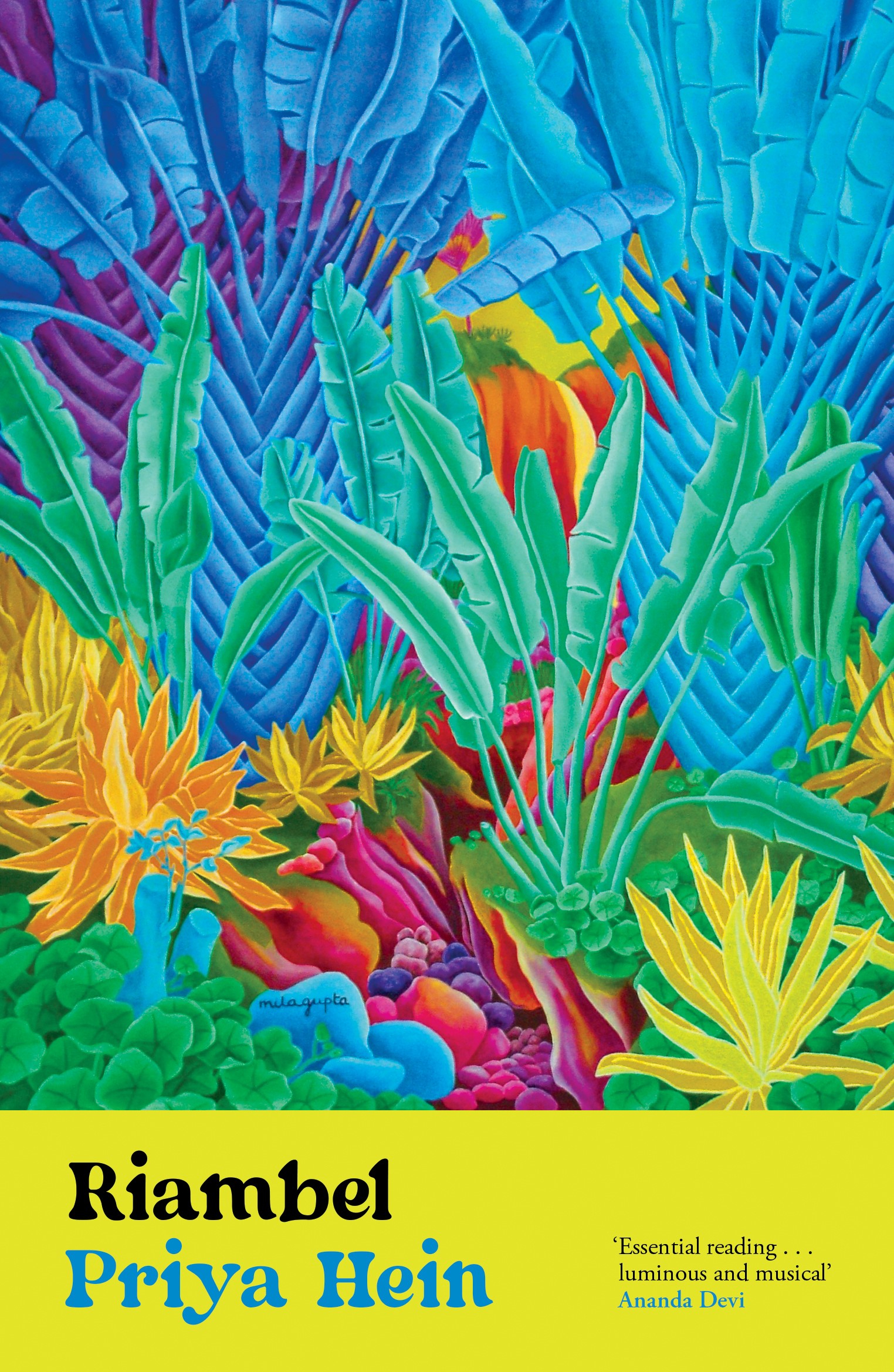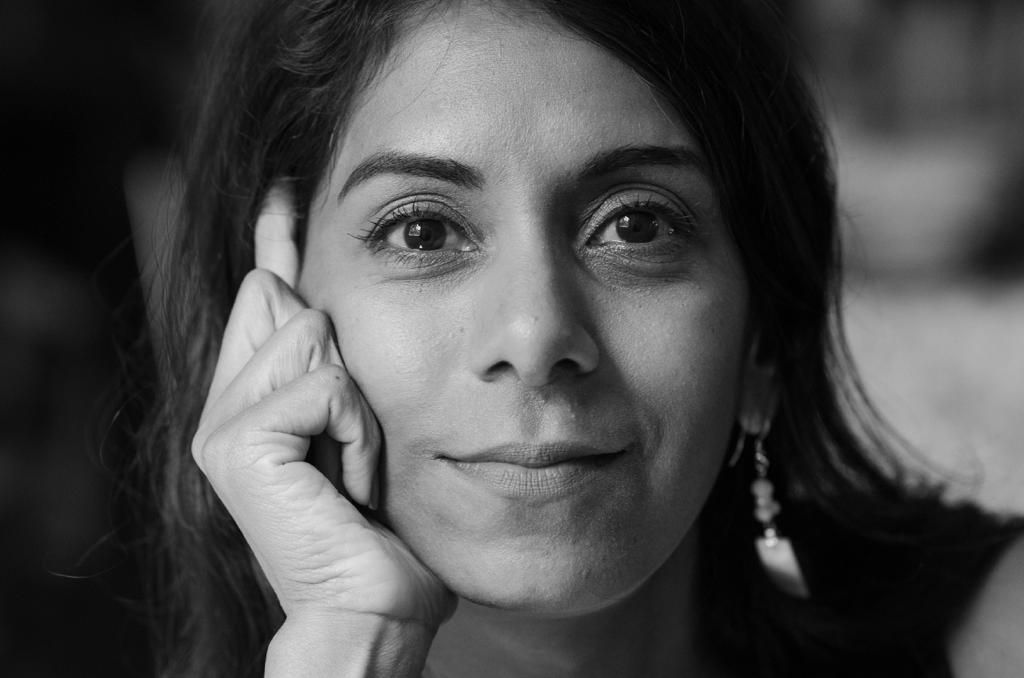Published May 27th, 2024
Interview
by Anushree Nande
Born in Mauritius, Priya Hein has written many children’s books published in English, French, German, Mauritian Creole, and Rodriguan Creole. Nominated for the Astrid Lindgren Memorial Award in 2017, she won the 2021 Jean Fanchette Prize for her adult debut manuscript Riambel published two years later in 2023.

Riambel, named after a small fishing village in the south of Mauritius, is a lyrically told coming-of-age herstory shaped by fragments. We follow teenaged protagonist Noemi, who lives in the shanties of the village, and has to leave school to help her mother, who works as a maid for one of the island’s richest and oldest white families. At just 160 pages, this is a fiery, urgent, and harrowing novel about racism and reckoning, about colonial powers and slavery, about language, food, culture and intergenerational trauma, especially suffered by women. It is a lament and yet — this is a testament to the author — there is also an undercurrent of the softest, most luminous hope of “one day.”
Priya and I have been in contact for a few years, but the right timing for this interview presented itself only now. We chatted via email and this is an edited version of our conversation.
Anushree Nande: In your introduction to the book, you write about how the story flowed out of you over a weekend in summer 2020. Can you tell us where Riambel sprung from?
Priya Hein: Riambel is my debut novel, after having written children’s books and short stories for my children which were eventually published. I wrote the first draft over one long weekend during the Black Lives Matter movement, after the brutal murder of George Floyd.
The book questions the vestiges of colonialism in the modern world through Noemi. I was living in Germany at the time, where I had been discouraged to speak about the racism I had experienced as an immigrant woman. This was my way of protesting in response to some of the disturbing comments and discussions I was hearing around me. I felt compelled to write about racism, white supremacy, and entitlement from the perspective of descendants of the former enslaved. The book is not limited to white supremacy in Mauritius but applies in the global context, although at the time I did not think that anyone except my immediate family would read my text. Writing Riambel was a way for me to channel my emotions, and I could not rest until I had written everything I and my characters had to say. It was an exhausting experience and yet I felt lighter and relieved after writing the first draft.
Anushree: Throughout the story, apart from Noemi's voice, you use scraps of slave songs, streams of consciousness, poetry excerpts, local recipes, and other interludes and asides to weave a whole, with frequent Creole. It is also an increasingly fragmented narrative — I read somewhere that this is, perhaps, to show a verbal and storytelling representation of how trauma can affect coherence in every aspect. To what extent was this hybrid narrative style planned?
Priya: When I sat down to write Riambel, the fragmentary form came naturally. Words, thoughts, poems, voices of the enslaved in French, English, and Creole came pouring out of me in a flow like an irrepressible tide.
Women were reduced into submission as a form of survival in a deeply patriarchal society. And since these women were not allowed to take up space, I thought I’d write about herstory in the form of vignettes — like the strokes of a painting tainted by the physical and psychological abuses they had to face.
The novel is broken down into scraps as a testimony to the effects of trauma on one’s psyche after suffering years of abuse at the hands of oppressors. I weaved in songs intertwined with recipes, poems, and voices from the past, in a sea of constantly shifting pithy narratives as victims of trauma have difficulties stringing together coherent narratives when they break down.
Anushree: Can you elaborate on your use of the ancestral chorus that accompanies Noemi and its significance to the story, specifically her story?
Priya: Throughout the story Noemi is haunted by voices of her ancestors, women who had suffered at the hands of the sugar barons. These parallel stories to some extent echo Noemi’s own as, even years after the abolishment of slavery, we wonder how much has really changed and whether history or herstory was cruelly repeating itself.

Anushree: I'd love to know your thoughts about recipes as records, as you've used them here.
Priya: The women in my novel, enslaved or descendants thereof, spent considerable time concocting dishes in the kitchen. Unlettered, it was a way for them to preserve their heritage through something as basic and primaeval as food. In the book, the recipes provide a culinary escapade from the atrocities they endure, where the simple act of cooking becomes deeply therapeutic. By incorporating recipes, I wanted to add some flavour and tenderness to the text and give the reader some breathing space in between fragments as a kind of interlude. The simple dishes illustrate how the women resourcefully made use of local products in order to sustain themselves and their families and how they adapted the recipes for the European settlers. A couple of the dishes are actual family recipes that my grandma had passed on to my mother who in turn has taught me how to prepare them.
Even after having everything taken away from them, they were still generously sharing their secret family recipes with their descendants. By encompassing the small acts of day-to-day life of those in service, I wanted to honour these hard-working women like my mother and grandmothers, including my great-great-grandmother who was an indentured labourer brought in from India by the British as part of “The Great Experiment” after slavery was formally abolished in 1835. The success of this Mauritian experiment led to its adoption by other colonial powers to use “free” labour to replace slavery on sugar plantations.
Anushree: Why did you choose the village of Riambel to root Noemi's story?
Priya: The novel borrows its name from a fishing village located in the south of Mauritius, where I have spent a lot of my school holidays. I am deeply attached to that part of the island, which has remained relatively undeveloped compared to the rest of Mauritius. The south has the distinct feeling of a bygone era that is still wild and inspiring. Although the word “riambel” could be interpreted in French as “rire en belle” (meaning “to laugh wholeheartedly”), it actually comes from the Malagasy word “Ariambello,” which means “sunny coast,” which is rather ironic because life on the sugar plantations was anything but sunny. Nowadays people often think of Mauritius as a paradise, so the novel depicts the lives of the people behind these picture-perfect postcards.
Anushree: You were born in Mauritius and have since lived in Belgium, Britain, France, Germany, and Luxembourg. You speak multiple languages. What are the ways in which this has influenced and continues to influence your work, the way you view the world, and the stories that you tell?
Priya: Living in different countries really opened my mind, made me want to know more about my own ancestors and made me question my place in the world. I learned about racism, slavery, and the immigrant experience by reading authors such as Jesmyn Ward, Toni Morrison, Jhumpa Lahiri, Ananda Devi, Bernadine Evaristo, Nathacha Appanah, J.M.G Le Clézio, Marie-Thérese Humbert, and Geneviève Dormann, to name a few. The distance from home also provided me with a different perspective and I felt encouraged to research and write more about my own heritage. Seeing how other countries acknowledge and deal with their past made me realise that we need to do more in Mauritius e. g. in terms of slavery museums. Unfortunately, Mauritians are uncomfortable talking about slavery and its long-lasting consequences. Even at school we were taught very little about indentureship, slavery, and our own legacy. It was only years later that I learned more about my ancestors who came to Mauritius in 1874 on The Malda from India as part of “The Great Experiment” to test the system of indentured labourers led by the British.
Anushree: There is a strong focus on herstory in Riambel. Can you share your hopes for this book and what you wish readers to take away from it?
Priya: History — His Story — was written mostly by men and tainted by the male perspective. Women were often ignored or erased from history. As mentioned above, I wrote about herstory to give the women visibility and the credit that they deserve. For instance, in the book, I refer to the plight of the Chagossians who were dumped in Mauritius during the 1960s/70s. It was actually the Chagossian women who started the long and arduous fight to reclaim their islands after being forcibly removed from their homes by the British, who had leased their islands to the Americans for them to build an American airbase on Diego Garcia.
In response to your question about what I would like readers to take away from Riambel I would say the following:
First of all, there is always another side of the story, and secondly, it is for us, the Noemis of this world, victims of trauma and institutionalised racism, to say no. Noemi. No-emi. NO. For us to protest, and to rail against the long-standing structures of class and ethnicity — to break the silence of His Story.
Nationality: Indian
First Language(s): Marathi
Second Language(s):
English,
Hindi,
German,
Spanish,
Sanskrit
Supported by:

